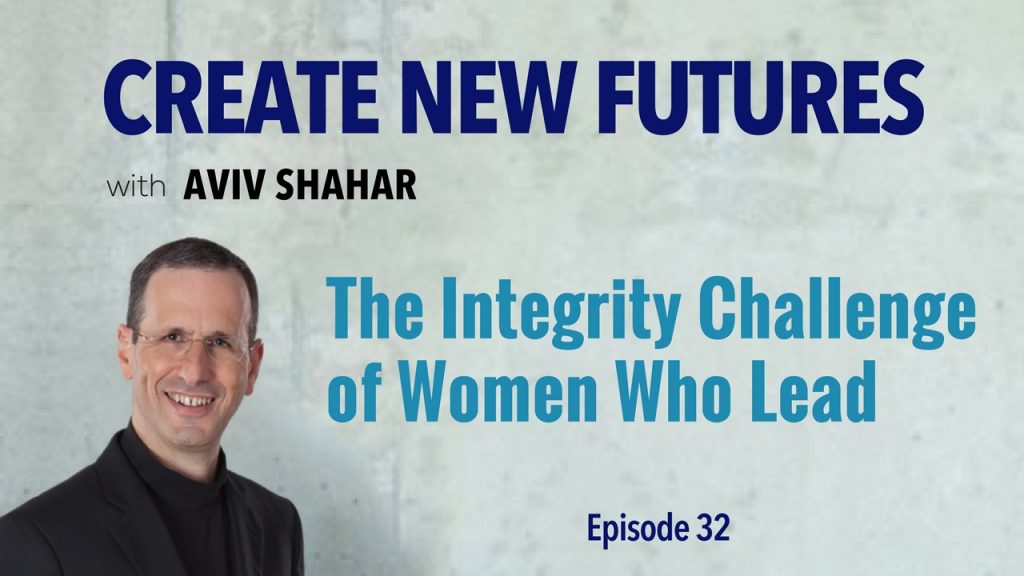Hi Leader,
Editor note: the recorded audio episode includes more than the written format.
In my recent article The Future of Leadership, I reflected on the process I used to respond to a question I was asked about the traits I admire in female leaders. In my reply, I reframed the initial question, placing it in the broader context of the evolving requirements of leadership.
In this key, I use the same approach to reflect on the following question. It was posed by a female manager who was concerned about maintaining her integrity in the face of others' perceptions of her leadership style.
"I received feedback from a male executive that I am not "soft" enough in my approach, and occasionally have come across as too strong or even rude. I feel that had I been a man speaking as plainly, honestly, and succinctly as I did, my approach would have been considered appropriate, if not applauded. While I find this perception disconcerting, I'm not sure how to remain in integrity with myself as I try to accommodate and adapt to this feedback. Although I am open to trying new things, I don't love what I perceive to be a double standard. How should I handle this, and similar, unsolicited feedback? What suggestions can you offer for how I might respond in a way that I feel good about?"
I appreciated the courage and the honesty in the question. Many women experience a double standard at work and are faced with a tilted playing field and/or unhelpful comments. They need to decide whether to confront the challenge head-on, navigate around it or develop strategies to neutralize the hindering conditions. Consistent with the thought process that I described in my previous key, the first principle that guided me in this case was to offer my client the greatest situational value and help. To do that, I first recast her question, providing a larger frame or context before I moved to address it.
The Integrity Challenge of Women Who Lead

Listen Here: Episode 32 - The Integrity Challenge of Women Who Lead
Here is how I approached the situation: "There are two elements in this question. One has to do with communication style, and the other concerns the meaning of integrity. Let me address the integrity element first, and then explore the communication style aspect."
Next, I recast integrity inside a broader framework. Here is the essence of my reply: "The question seems to equate integrity with speaking plainly and honestly. I agree that the first dimension of integrity can be defined in terms of honesty - saying what you see and what you feel. However, my experience suggests that there are four additional dimensions of integrity from which you can choose in any given situation. These five dimensions represent increasingly higher levels of integrity."
- Integrity dimension 1: You say what you feel. You hold nothing back. You offer the full "truth" as you see it.
- Integrity dimension 2: Your actions match your words. While the focus of dimension #1 is on your words, this level shifts the emphasis to your actions.
- Integrity dimension 3: Your actions match your potential to contribute. The focus here is on your capability and potential. At dimension #2, for example, if you promise to deliver four alternative designs by Friday, you deliver the four alternatives you promised by Friday. At dimension #3, if you discover that you are able to deliver an additional design option and complete the work a day earlier, you deliver all five options by Thursday. You exceed your initial promise because holding yourself accountable for reaching your fullest potential to contribute takes precedence over limiting yourself to your words.
- Integrity dimension 4: Your actions match the need at hand. The focus here shifts from you and your potential to the situational need in front of you. Instead of asking, "How much am I capable of doing," you ask, "What is the need?" and "How can I best serve this need?"
Here is an everyday example of an intuitive expression of integrity dimension 4. When a five-year-old asks a question, the parents don't necessarily tell her all that they know and feel. Instead, they intuitively exercise "parental integrity," offering the best reply to reassure and address the underlying need that instigated the question. They do not lie to her; rather they apply care because they love her. - Integrity dimension 5: You act and live into purpose. The focus here shifts from the situational need to purpose alignment. You serve a cause in whatever way it needs you to serve. Integrity is expressed in the degree to which you master the attunement of your life with your purpose. You seek to be in concert with a given cause, which means you allow its mission to rearrange your priorities based on its evolving needs.
The point in reflecting on these five dimensions of integrity is to create possibilities for you to situationally choose your response to achieve your desired intent. If you limit your map of meaning to integrity dimension 1 - saying honestly and frankly what you feel - then you are likely to see behaviors coming out of dimensions #2, #3, #4 and #5 as dishonest. The implication is that you expect yourself and others to navigate through life with one guiding criterion: expressing what each one feels at any given moment in time.
| Integrity dimension #5 | You are congruent with purpose |
| Integrity dimension #4 | Your actions match the need |
| Integrity dimension #3 | Your actions match your potential to contribute |
| Integrity dimension #2 | Your actions match your words |
| Integrity dimension #1 | You say what you feel |
The fivefold integrity framework offers an alternative guiding principle grounded in situational awareness and personal mastery that enables you to move flexibly through these dimensions. It allows you to customize and personalize your communication and responses situationally. However, it requires a high level of self-knowledge, situational awareness, and behavioral versatility and alacrity.
Up until this point, my response has not directly addressed the manager's concern and question. I admit that it is not easy to take the longer road. In a high-velocity world that expects soundbite answers, some may experience my approach as frustrating or evasive. Nonetheless, sometimes we must slow down before we speed up. In this case, to provide the client with the most useful response to her question, we needed to update her map of meaning for integrity.
There is one more element in this approach. A guiding instinct of my coaching and advisory work is that the primary objective of the conversation we are in is not to attempt to "fix the problem." My conviction is that our conversation seeks to free you up from feeling you have no good options to discovering a broader range of options from which to choose.
When a client describes to me a situation that offers "no options" or even a limited binary set of options, I challenge us to use the conversation to open three, four, or even five more optional doors. The integrity framework is one tool that enables access to a wider range of choices. There is no right or wrong, and no moral judgment, attached to the integrity dimensions. The simple game-changer is the mental model shift, and the power that comes from recognizing that you have choices.
Every situation creates its choice point. You have multiple alternative paths and a series of plausible responses from which to select. The first coaching imperative is to challenge the tendency to quickly narrow the range of options, and instead to help you expand them. This simple shift to recognizing that you have multiple options is liberating and greatly empowering.
I bring to interactions with clients deep conviction that they are highly intelligent, resourceful, and capable, with capacities and talent beyond anything they have expressed to this point. When you are centered in your core and in your highest intent, reflecting on a broader set of options empowers you to choose the optimal response and path forward.
With this context in mind, here is how I responded directly to the manager's question:
You may say, "It's not fair, why do I have to change the way I communicate to please the people I work with." You don't have to. It is human to want to speak your mind openly. It's human to want to fight gender bias. On the other hand, it also is human to want to develop your versatility and impact, and to assess wisely how to achieve the results you hope to create by applying yourself as effectively as possible in each situation.
There are many managers in the workforce who lack emotional, psychological, and/or behavioral maturity. There are men who feel insecure next to strong and eloquently bright women. They also often feel insecure next to other men with those characteristics, as can also be the case with women.
Ultimately, another person's insecurity is his/her challenge, not yours. You are the only person you can control, and you are the only one who can make your choices. What others do is their choice. Ask yourself the following questions: what do I hope to achieve? Would I rather be right or be effective?
The answer probably is situational. In some cases, you would say that being right is a higher principle than being effective. But I submit to you that in four out of five situations, being right is more about stoking one's own ego by proving the other person wrong than by achieving the objective. Remember, there is also the discovery that holding on to our self-image and how we perceive ourselves to be is not necessarily holding on to our integrity. In certain situations, it may just be pride. In that context, a conversation about principles is merely a masquerade. Perhaps in only one of five scenarios is "being right" the effective strategy.
Eighty percent of the time, then, finding a way to be effective is the wiser path forward and thus represents the "right thing" to do. In those situations, bringing up fairness or even justice to argue that your point is the correct one may only confuse the conversation. You be the judge: in which category would you place the situation you described?
Now let's talk about communication style. I don't think you should compromise your strength and your power. And yes, I do think women often find themselves, even in 2018, in the difficult and challenging circumstance of being subject to an obvious double standard. To ignore that reality is to put blinders on yourself, which is unwise and even foolish.
Simply stated, the question for you is - how do you choose to manage that reality? Feeling resentful and or bitter about it is not effective. Society and culture evolve slowly, and resentment is self-poisoning. Therefore you must choose. You cannot afford to poison yourself with ineffective responses. Instead, I recommend that you accelerate your growth and develop your personal mastery to transcend the resistance and challenges that present themselves to you.
For example, demonstrating thought-leadership by developing your wit and intellectual fire power is a great way to effectively navigate resistance. My recommendation is that you explore and play with a variety of behavioral strategies, with the singular objective of creating for yourself the versatility of a Swiss army knife with seven or twelve tools instead of just one or two.
In a one-on-one coaching setting, the natural next step of the conversation is to develop those additional plausible and effective responses.
Now it's your turn. Turn the key. How will you create a greater range of options for yourself? How will you apply the five dimensions of integrity situationally? How will you take your personal mastery and freedom to whole new level?

